As the weather gets colder and colder here in Missouri, we layer up and make sure we’re ready for the great outdoors. We know that long-term exposure to cold could be risky to our well-being, from frost bite to “catching cold.” But did you know that cold weather could potentially harm your hearing as well? Let’s take a look at how winter temperatures could potentially cause tinnitus and hearing loss, with a condition called exostoses, or surfers ear.
What is Surfers Ear/Exostosis?
According to Dr. Colin Brown, an ear-nose-throat specialist in New Zealand, where surfers are plentiful: “Surfers ear (otherwise known as exostosis) is a condition where the ear canal is narrowed by bone which grows slowly in the ear canal over a long period of time. The bone grows in lumps, which forms bulges, behind which water may be trapped. The new bone growth is stimulated by exposure to cold water and cold air.”
Perhaps for obvious reasons, the condition is called surfers ear: surfers are exposed regularly to cold water from the ocean and when moving at relative fast speeds, the wind chill factor could expose to the ears to cold air. This condition also affects people who windsurf, kayak, sail, jet-ski, kite surf, or dive. Even if the water is warm, people who participate in these sports could be at risk for exostosis due to the evaporative cooling from exposure to fairly-rapid wind.
Symptoms of surfers ear/exostosis include: water getting stuck in the ear – or the feeling you get when you need to shake your head or hop to clear the water from your ear canals; ear canal infections, which actually increase as the bones grow; and reduced hearing abilities.
Exostosis in Colder Weather
For those of us who are landlocked in the cold Midwest, surfing may not be something that could lead to exostoses, but with exposure to cold air and transitioning between environments indoors and outdoors with different temperatures, we may be at risk for developing the condition.
To be clear, the coldness would have to be extreme and exposure would have to occur over a long period of time for exostoses to develop. According to Dr. Roger Henderson in Bel Marra Health, “In severe cases, cold weather can cause abnormal bone growths within the ear canal, known as exostosis. This is the body’s way of attempting to protect the ears by creating a barrier against the cold. Exostosis can constrict the ear canal, contributing to increased earwax build-up, as the ear can no longer expect earwax effectively. This can be heightened in cold weather as wax can harden when ears are exposed to low temperatures, making ears more likely to become blocked.”
If you have a hearing loss that you treat with hearing aids, you may be at higher risk for hardening earwax during the colder months of the year “because having a ‘foreign object’ in the ear causes it to produce more wax.” With even more wax production, blockages in your ear canal could lead to infection, earache, headaches, or tinnitus (ringing of the ears).
When temperatures drop, make sure you are protecting your ears with a hat or earmuffs, to make sure that cold air is not entering your ear canals.
Remove Earwax Safely to Prevent Exostosis
Earwax blockage could eventually lead to hearing loss. It is important, though, to make sure that earwax is removed safely. The middle ear environment and the ear canals are very sensitive and could easily be injured. Hearing specialists discourage the use of cotton swabs to remove earwax, finding them to be ineffective. In fact, cotton swabs tend to further impact earwax in the ear, leading to further problems.
If you experience a heavy amount of earwax blockage, visit a medical professional for earwax removal. If you are removing earwax at home, make sure not to stick any foreign objects into your ears or use ear candles.
Cold Weather & Moisture Could Also Harm Your Hearing Aids
Do you wear hearing aids to treat your hearing loss? Winter weather could also be harmful to your hearing aids. Moving between the cold outdoors and the warm heated indoors could lead to moisture buildup in your hearing aids. Use a dehumidifying unit to remove moisture. If you are experiencing problems with your hearing aids, visit us at Hearing Wellness Solutions.
For all of your hearing health needs, our team at Hearing Wellness Solutions is here for you. Contact us today if you have questions or want to schedule a consultation.

